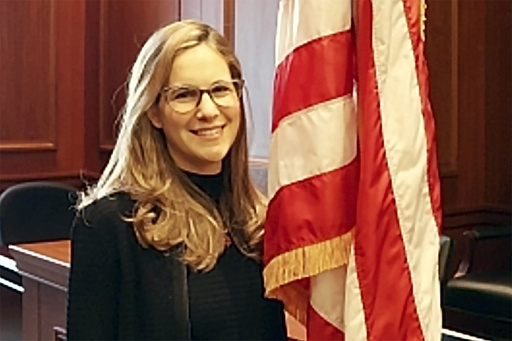
NEW YORK — The resignation of Manhattan’s top federal prosecutor, Danielle Sassoon, along with five senior Justice Department officials, has created a significant stir after she declined an order to dismiss corruption charges against New York City Mayor Eric Adams. This development marks an escalation in a tense standoff over the perceived influence of partisan politics on criminal allegations that emerged shortly after the commencement of the Trump administration’s new term.
Sassoon, a Republican serving as the interim U.S. attorney for the Southern District of New York, issued allegations against the Justice Department, claiming the decision to drop the case was part of a “quid pro quo” arrangement aimed at securing Adams’ assistance with Trump’s immigration policies. She expressed her confidence that the Democratic mayor had committed the offenses outlined in his indictment and potentially more. Before the clash, Sassoon indicated the prosecutors were ready to bring additional charges against Adams for allegedly destroying evidence and misleading the FBI.
In an eight-page letter to Trump’s acting attorney general, Pam Bondi, Sassoon conveyed her confusion about the quick and seemingly insufficient process leading to the decision to halt the case. Bondi had previously expressed intent to review the status of the Adams case after Sassoon’s office remained silent for two days following the directive to dismiss.
Following the order from the acting deputy U.S. attorney general, Emil Bove, who is a former legal representative for Trump, Sassoon’s resignation was accepted. He contended that she was “incapable of fairly and impartially” handling the case. As part of this reshuffle, case prosecutors were placed on administrative leave, facing internal inquiries.
Bove outlined in his letter the department’s intentions to file a motion to drop the charges against Adams and prevent any further investigation into the mayor. However, as of Thursday evening, there was no indication that the case had been formally dismissed, leaving the situation open.
The department’s public integrity division was also shaken by resignations, including the acting chief and multiple deputy chiefs, in what seems to be a deep disapproval of the ongoing developments.
The timing of Sassoon’s resignation aligns with a controversial political narrative, especially given Adams’ previous denial of any wrongdoing. He pleaded not guilty last September after being charged with accepting over $100,000 in illegal campaign contributions and enjoying lavish benefits while serving as Brooklyn’s borough president.
In light of the changing political climate, federal agents were previously conducting investigations into some of Adams’ aides, but the fate of that inquiry remains uncertain. Bove had previously directed Sassoon to expedite the dismissal of the case so that the mayor could freely assist with the Trump administration’s immigration initiatives and campaign without the hindrance of criminal charges amidst competitive primary elections.
The conflict reached a critical point when Sassoon accused Adams’ lawyers of proposing a deal that would benefit both parties—dropping the criminal charges in exchange for the mayor’s collaboration on immigration. Sassoon characterized this as an alarming and precarious standard for legal conduct.
Adams’ legal representative, Alex Spiro, denied these allegations, asserting that no quid pro quo was proposed or requested during discussions with the Justice Department, emphasizing that they answered questions about the intersection of the case with national security honestly.
The exchange of critiques between Sassoon and Bove starkly illustrated the ongoing discord surrounding a high-profile public corruption case, significantly intensifying scrutiny over the relationship between the department’s leadership and its New York office. This confrontation raises concerns about the potential for political motivations overriding legal assessments in this and possibly future cases.
The Southern District of New York has established a reputation for upholding legal integrity in tackling fraud and political corruption, earning the moniker “the sovereign district.” Sassoon served as interim U.S. attorney from January 21, shortly after Trump took office, but was recently replaced by Matthew Podolsky.
Observers noted that it was unusual for a directive to drop charges to stem from political motivations rather than legal grounds. The ongoing saga also beckons comparisons to past controversies during Trump’s previous term, including notable leadership disputes within the Justice Department.
Prosecutors had gathered evidence suggesting that Adams directed aides to solicit illicit foreign contributions, a practice prohibited under federal law, further complicating the legal landscape surrounding the case. Even as recently as early January, legal teams reaffirmed the active status of the investigation, underscoring the impending complications arising from the dismissals and political maneuvering.

